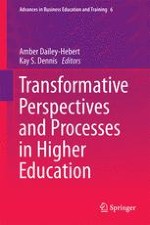2015 | OriginalPaper | Buchkapitel
10. Recommendations from Instructors for Adopting Successful Online Learning
verfasst von : Maike Gerken, Therese Grohnert
Erschienen in: Transformative Perspectives and Processes in Higher Education
Aktivieren Sie unsere intelligente Suche, um passende Fachinhalte oder Patente zu finden.
Wählen Sie Textabschnitte aus um mit Künstlicher Intelligenz passenden Patente zu finden. powered by
Markieren Sie Textabschnitte, um KI-gestützt weitere passende Inhalte zu finden. powered by
